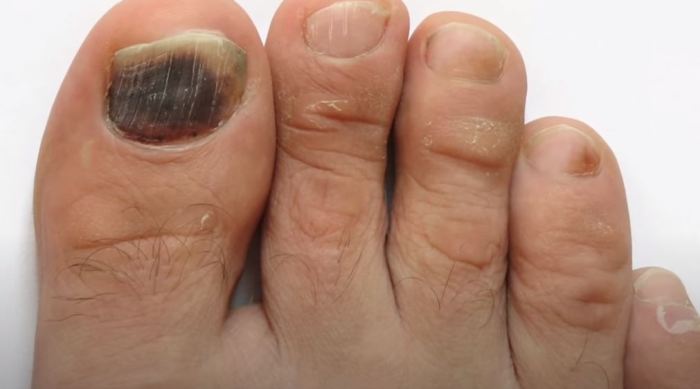
Dive into the world of toenail fungus remedies with this comprehensive guide that uncovers natural solutions, over-the-counter creams, tea tree oil benefits, and vinegar foot soaks. Get ready to say goodbye to pesky fungus and hello to healthy nails!
Toenail Fungus Remedies
Toenail fungus can be a stubborn and unsightly condition, but there are several natural remedies that can help in treating it effectively.
List of Natural Remedies:
- Apple Cider Vinegar: Its antifungal properties can help in fighting toenail fungus. Mix equal parts of apple cider vinegar and water, and soak the affected foot for 30 minutes daily.
- Coconut Oil: Apply coconut oil directly to the affected nail to moisturize and fight the fungus with its antifungal properties.
- Garlic: Crush a few garlic cloves and mix with olive oil, then apply to the affected nail. Garlic has antifungal and antibacterial properties.
Effectiveness of Over-the-Counter Antifungal Creams:
Over-the-counter antifungal creams can be effective in treating mild cases of toenail fungus. They usually contain ingredients like clotrimazole or terbinafine that help in fighting the fungal infection. However, for more severe cases, prescription-strength antifungal medications may be necessary.
Benefits of Using Tea Tree Oil:
Tea tree oil is known for its antifungal and antibacterial properties, making it a popular natural remedy for toenail fungus. Apply tea tree oil directly to the affected nail or mix it with a carrier oil like coconut oil for better results.
Process and Benefits of Using Vinegar Foot Soaks:
Vinegar foot soaks can help in creating an acidic environment that is inhospitable to fungus. Mix one part vinegar with two parts warm water and soak your feet for 15-20 minutes daily. Vinegar foot soaks can help in reducing toenail fungus symptoms like itching and inflammation.
Cosmetic Surgery
Cosmetic surgery for toenail fungus offers a more immediate solution to improve the appearance of affected nails. Let’s delve into the various procedures available and the associated risks and benefits.
Types of Cosmetic Procedures
- Laser Treatment: This procedure involves using a laser to target and eliminate the fungus in the nail. It is relatively painless and has minimal downtime.
- Nail Restoration: This involves removing the affected part of the nail and replacing it with a prosthetic nail to restore a more natural appearance.
Risks and Benefits
- Risks: While cosmetic surgery can improve the aesthetic look of the toenails, there are risks involved such as infection, allergic reactions to anesthesia, or nail damage during the procedure.
- Benefits: The benefits include faster results compared to traditional treatments, improved nail appearance, and increased self-confidence.
Recovery Process
- After undergoing cosmetic surgery for toenail fungus, patients may experience some discomfort and swelling. It is important to follow post-operative care instructions provided by the surgeon to ensure proper healing.
- Recovery time varies depending on the type of procedure performed, but most patients can resume normal activities within a few days to a week.
Improving Nail Appearance
- Cosmetic surgery can significantly improve the appearance of toenails affected by fungus by restoring a more natural look and addressing any deformities caused by the infection.
- Patients often report feeling more confident and satisfied with the aesthetic results of cosmetic surgery for toenail fungus.
Foot Health
Maintaining foot health is essential in preventing toenail fungus and ensuring overall well-being. Proper care and attention to your feet can go a long way in avoiding common foot problems. Let’s explore some tips and practices to keep your feet healthy.
Importance of Proper Footwear
Wearing the right footwear plays a crucial role in preventing toenail fungus. Ill-fitting shoes can cause pressure on your toenails, leading to fungal infections. Opt for shoes that provide ample space for your toes and allow for proper ventilation. Breathable materials like leather or mesh can help keep your feet dry and reduce the risk of fungus growth.
Regular Foot Care Routines
Establishing a regular foot care routine is key to managing toenail fungus. Make sure to wash your feet daily with mild soap and warm water, paying extra attention to the spaces between your toes. Trim your nails straight across and avoid cutting them too short to prevent ingrown toenails. Moisturize your feet regularly to keep the skin soft and hydrated.
Connection Between Foot Health and Overall Well-being
Your feet are the foundation of your body, and their health can impact your overall well-being. Ignoring foot problems like toenail fungus can lead to discomfort, pain, and even mobility issues. By prioritizing foot health, you can prevent infections, maintain proper posture, and support your body’s balance and movement. Remember, healthy feet are happy feet!
Heart Disease
When it comes to toenail fungus, the impact it can have on heart health is often overlooked. However, there is a potential link between toenail fungus and heart disease that should not be ignored. By understanding this connection, individuals can take steps to improve both their nail health and heart health simultaneously.
Importance of Managing Toenail Fungus for Heart Health
Managing toenail fungus is not only crucial for the appearance of your nails but also for your overall health, especially if you have heart disease. The presence of toenail fungus can lead to infections that may affect the heart and exacerbate existing heart conditions. Therefore, treating toenail fungus is essential for maintaining heart health.
Lifestyle Changes for Toenail Fungus and Heart Health
- Practice good foot hygiene by keeping your feet clean and dry to prevent fungal growth.
- Avoid walking barefoot in public areas to reduce the risk of toenail fungus infection.
- Eat a balanced diet rich in fruits, vegetables, and lean proteins to support both nail and heart health.
- Engage in regular physical activity to improve circulation and overall cardiovascular health.
- Quit smoking and limit alcohol consumption, as these habits can negatively impact both toenail fungus and heart health.
Health Diabetes

Toenail fungus can have serious implications for individuals with diabetes, as they are more prone to developing infections due to compromised immune systems and poor circulation. In diabetic patients, toenail fungus can lead to further complications and delay in wound healing.
Implications of Toenail Fungus in Diabetic Individuals
- Increased risk of infection: Diabetic individuals are more susceptible to infections, and toenail fungus can further exacerbate this risk.
- Delayed wound healing: Toenail fungus can hinder the body’s ability to heal wounds, leading to potential complications such as ulcers.
- Nerve damage: Diabetic neuropathy can cause loss of sensation in the feet, making it difficult for individuals to detect early signs of toenail fungus.
Challenges of Treating Toenail Fungus in Diabetic Patients
- Systemic antifungal medications may interact with diabetes medications, requiring careful monitoring by healthcare providers.
- Topical treatments may not be as effective in diabetic individuals due to poor circulation in the feet.
- Increased risk of complications such as allergic reactions or skin irritation from antifungal treatments.
Importance of Managing Toenail Fungus for Diabetic Foot Health
- Prevention of infections that can lead to serious complications such as foot ulcers or amputations.
- Promotion of overall foot health and hygiene to reduce the risk of secondary infections.
- Early detection and treatment of toenail fungus can prevent further complications in diabetic patients.
Preventive Measures for Toenail Fungus in Diabetic Individuals
- Maintain good foot hygiene by washing feet daily and drying them thoroughly, paying special attention to the areas between the toes.
- Regularly inspect the feet for any signs of toenail fungus, such as discoloration or thickening of the nails.
- Wear breathable shoes and moisture-wicking socks to prevent fungal growth in the toenails.
- Avoid walking barefoot in public areas to reduce the risk of exposure to fungal infections.
Eating Disorders

Eating disorders can have a significant impact on overall health, including the health of our nails. Individuals with eating disorders may experience weakened immune systems, poor circulation, and nutrient deficiencies, all of which can contribute to the development and persistence of toenail fungus.It is essential to understand the challenges that individuals with eating disorders may face when managing toenail fungus.
These challenges can include a lack of focus on self-care, poor nutrition, and potential medication interactions that can affect the effectiveness of toenail fungus treatments.Addressing toenail fungus in the context of eating disorders is crucial for overall health and well-being. Fungal infections can spread and lead to more severe complications if left untreated, making it essential for individuals with eating disorders to prioritize their foot health.
Tips for Toenail Care in Individuals with Eating Disorders
- Avoid picking or tearing at the nails, as this can worsen the infection and lead to further damage.
- Keep nails trimmed and clean to prevent the buildup of fungus and bacteria.
- Ensure proper nutrition and hydration to support nail health and immune function.
- Consult with a healthcare provider or podiatrist for appropriate treatment options and guidance.
- Avoid sharing nail clippers or other tools to prevent the spread of infection.
Final Conclusion
As we wrap up our discussion on toenail fungus remedies, remember that taking care of your feet is crucial for overall well-being. Embrace these tips and tricks to keep your nails healthy and fungus-free. Here’s to happy feet and healthy nails!
FAQ Overview
Can toenail fungus be treated naturally?
Yes, there are several natural remedies like tea tree oil and vinegar foot soaks that can effectively treat toenail fungus.
Are over-the-counter antifungal creams effective?
Over-the-counter antifungal creams can be effective for mild cases of toenail fungus, but severe cases may require prescription medication.
How important is proper footwear in preventing toenail fungus?
Proper footwear plays a crucial role in preventing toenail fungus as it helps in maintaining good foot hygiene and ventilation.
Is there a connection between toenail fungus and heart disease?
There is a potential link between toenail fungus and heart disease, highlighting the importance of managing toenail fungus for overall health.
Can diabetic individuals be more prone to toenail fungus?
Yes, individuals with diabetes are more susceptible to toenail fungus due to compromised immune systems and poor circulation.





